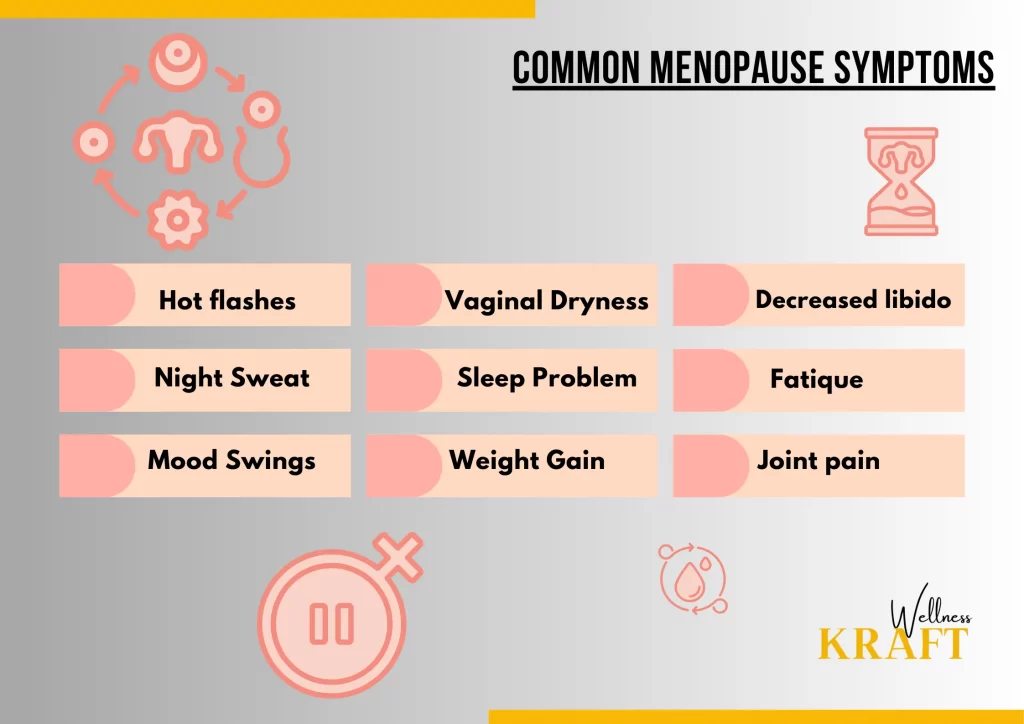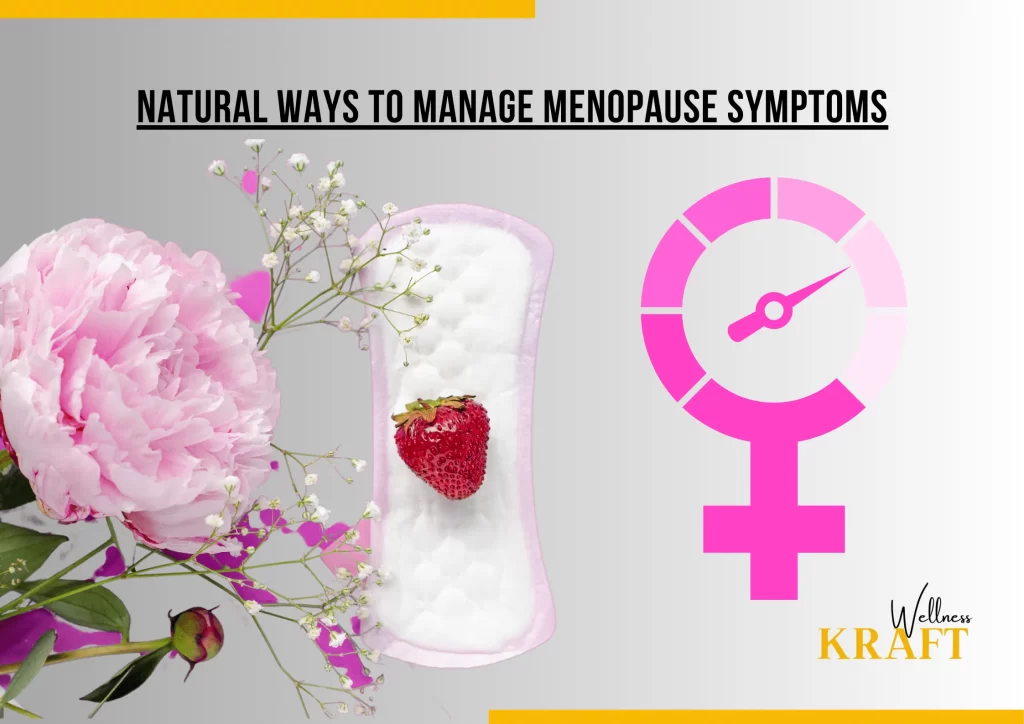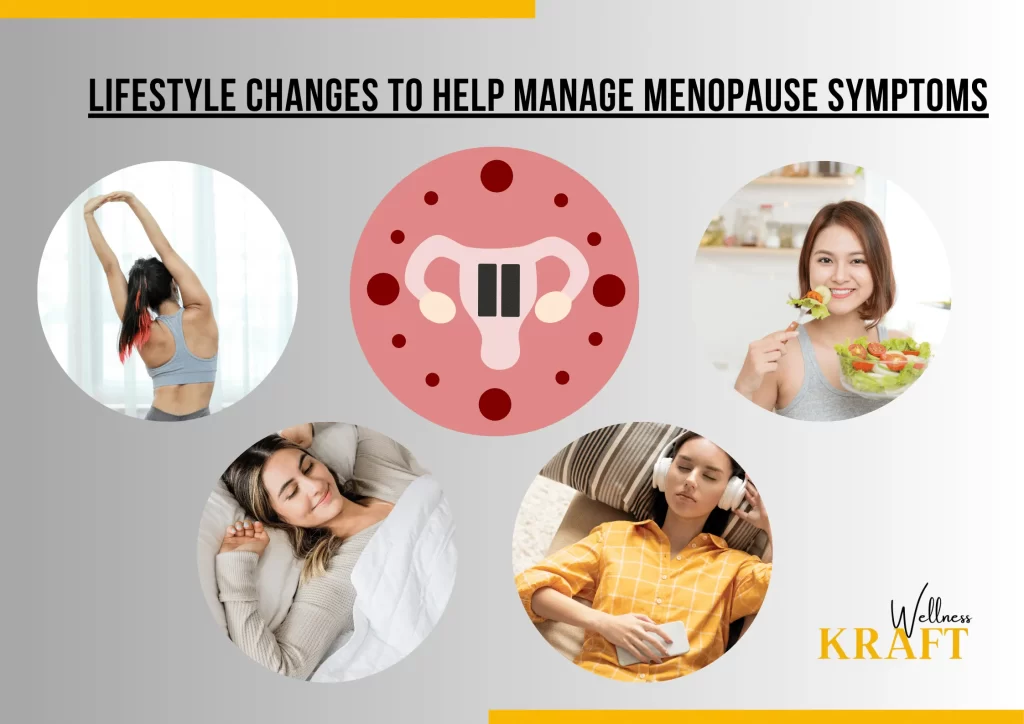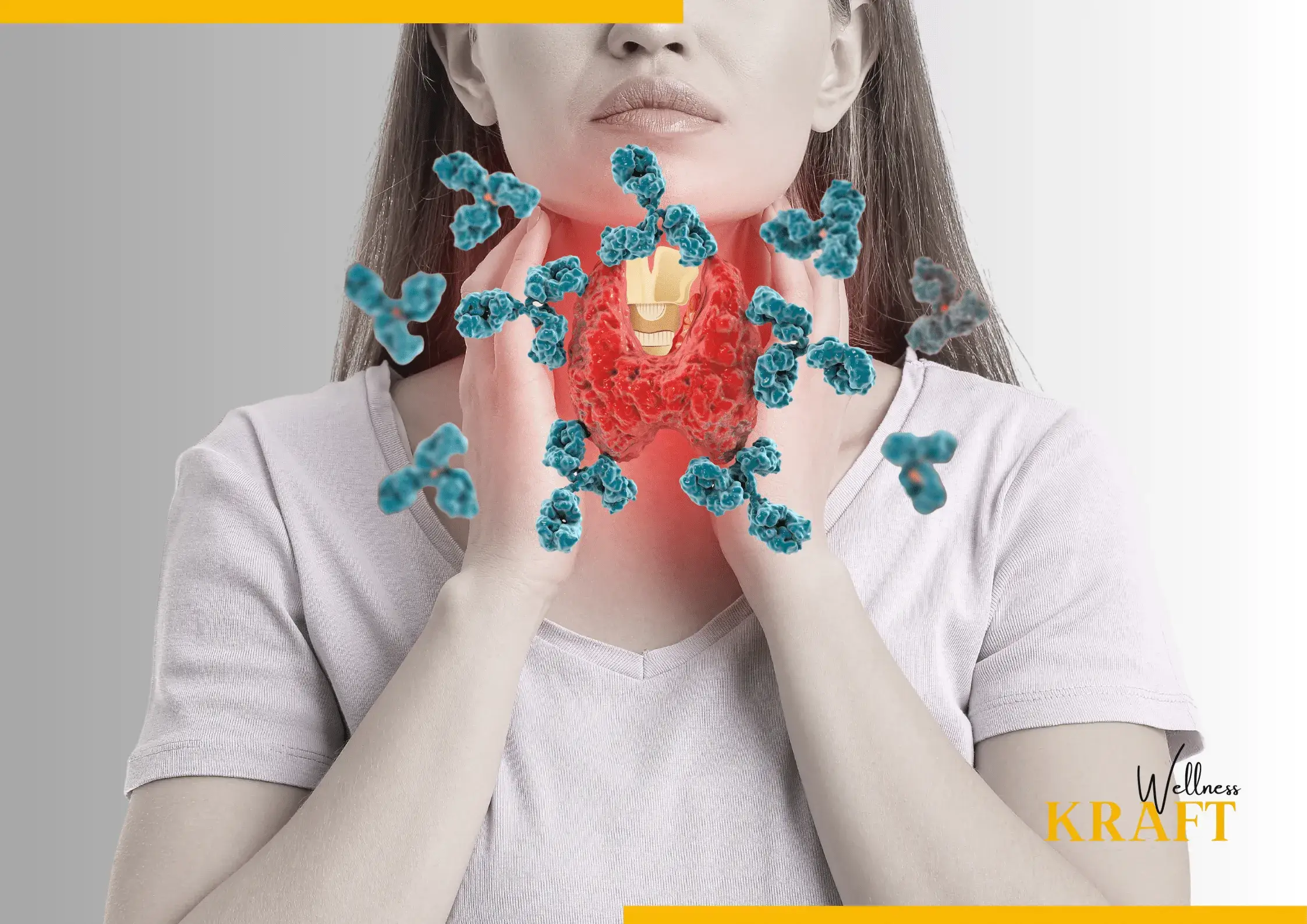“Menopause can be a time of introspection, development, and change. Accept the process and have faith in your body’s innate understanding and power to bounce back.” – Wellness Kraft
Introduction
The menopause, a biologically natural process, signals the end of a woman’s fertile years. Between the ages of 45 and 55, a big change typically takes place. During this time, women experience a decline in estrogen and progesterone levels, which can cause a range of symptoms.
While it is a normal and expected phase of life, it can be challenging for some women. Fortunately, there are several natural ways to manage the symptoms of menopause and improve your quality of life.
Table of Contents
Understanding Menopause
Menopause is defined as the permanent cessation of menstruation and is confirmed when a woman has gone 12 consecutive months without a menstrual period. It typically starts at 51 years old, although for some women, it might start sooner or later.
During this phase, a woman’s ovaries stop releasing eggs, and her body produces less estrogen and progesterone. These hormonal changes can cause a range of symptoms, including hot flashes, night sweats, mood swings, vaginal dryness, and difficulty sleeping.
While it is a natural part of aging, certain factors can cause it to occur earlier than expected. These include smoking, chemotherapy, and surgery to remove the ovaries. If you’re experiencing symptoms of menopause or have questions about the process, it’s important to talk to your healthcare provider.
Common Menopause Symptoms

Menopause can cause a variety of symptoms that vary from woman to woman. Some women may experience mild symptoms, while others may have more severe symptoms that significantly impact their quality of life. Here are some common symptoms:
Hot flashes:
A sudden feeling of warmth that spreads over the body, often accompanied by sweating and a rapid heartbeat.
Night sweats:
Hot flashes that occur during sleep, causing sweating and disruption of sleep.
Mood swings:
Rapid and intense changes in mood, including irritability, anxiety, and depression.
Vaginal dryness:
A decrease in estrogen can cause the vaginal tissues to become thin and dry, leading to discomfort and pain during intercourse.
Sleep problems:
Difficulty falling asleep or staying asleep, often due to night sweats or other symptoms.
Weight gain:
Hormonal changes can cause weight gain, especially around the abdomen.
Decreased libido:
A decrease in sex drive can be caused by hormonal changes and vaginal dryness.
Fatigue:
Many women experience fatigue and a lack of energy during menopause.
Joint pain:
Some women may experience joint pain or stiffness during menopause.
These symptoms can be challenging to manage, but there are several natural ways to alleviate them.
Natural Ways to Manage Menopause Symptoms

Managing menopause symptoms naturally can be effective and help you avoid the potential risks associated with hormone replacement therapy. Here are some natural ways to manage it:
1.Lifestyle Changes:
Making changes to your lifestyle can help alleviate menopause symptoms. Here are some lifestyle changes you can make:
Exercise: Regular physical activity can reduce hot flashes and night sweats and improve mood and sleep quality.
Diet: A healthy, balanced diet that includes plenty of fruits, vegetables, whole grains, and lean protein can help alleviate menopause symptoms and reduce the risk of chronic diseases.
Stress Management: High levels of stress can worsen menopause symptoms. Practicing stress-reducing techniques such as meditation, deep breathing, or yoga can help.
Sleep Hygiene: Creating a relaxing bedtime routine and sticking to a regular sleep schedule can help alleviate sleep problems.
2.Natural Supplements and Remedies:
Several natural supplements and remedies have been shown to help alleviate menopause symptoms. Here are a few of the most effective:
Black Cohosh: A plant extract that has been shown to reduce hot flashes and night sweats.
Red Clover: A plant extract that may help alleviate hot flashes and improve bone density.
Soy: A food rich in phytoestrogens that may help reduce hot flashes.
Flaxseed: A food rich in lignans, which have been shown to reduce hot flashes and improve mood.
3.Alternative Therapies:
Alternative therapies can help alleviate menopause symptoms by promoting relaxation and reducing stress. Here are some effective alternative therapies:
Acupuncture: A form of traditional Chinese medicine that involves the insertion of thin needles into specific points on the body to promote healing and alleviate symptoms.
Yoga: A mind-body practice that combines physical postures, breathing exercises, and meditation to promote relaxation and reduce stress.
Meditation: A practice that involves focusing your attention on a particular object, thought, or activity to promote relaxation and reduce stress.
Massage: A therapeutic practice that involves manipulating the body’s soft tissues to promote relaxation and reduce stress.
Lifestyle Changes to Help Manage Menopause Symptoms

Making lifestyle changes can be effective in managing menopause symptoms. Here are some lifestyle changes you can make:
1.Exercise:
Regular physical activity can reduce hot flashes and night sweats and improve mood and sleep quality. Try to exercise for at least 30 minutes, most days of the week, at a moderate level. Some exercises that can be helpful during menopause include:
Aerobic exercise: Activities that increase your heart rate, such as walking, cycling, or swimming.
Strength training: Exercises that use weights or resistance bands to build muscle and improve bone density.
Yoga: A mind-body practice that combines physical postures, breathing exercises, and meditation to promote relaxation and reduce stress.
2.Diet:
A healthy, balanced diet that includes plenty of fruits, vegetables, whole grains, and lean protein can help alleviate menopause symptoms and reduce the risk of chronic diseases. Here are some dietary recommendations:
Increase your intake of calcium and vitamin D to support bone health.
Eat foods rich in phytoestrogens, such as soy products, flaxseed, and legumes.
Avoid spicy foods and caffeine, which can trigger hot flashes.
Limit your intake of alcohol, which can worsen mood swings and disrupt sleep.
3.Stress Management:
High levels of stress can worsen menopause symptoms. Practicing stress-reducing techniques can help. Here are some stress management techniques you can try:
Meditation: A practice that involves focusing your attention on a particular object, thought, or activity to promote relaxation and reduce stress.
Deep breathing: A technique that involves taking slow, deep breaths to calm the body and reduce stress.
Yoga: A mind-body practice that combines physical postures, breathing exercises, and meditation to promote relaxation and reduce stress.
Relaxation techniques: Activities that promote relaxation, such as taking a warm bath, reading a book, or listening to calming music.
4.Sleep Hygiene:
Creating a relaxing bedtime routine and sticking to a regular sleep schedule can help alleviate sleep problems. Here are some recommendations to enhance your sleeping habits:
Establish a regular sleep schedule and stick to it, even on weekends.
Establish a calming bedtime routine that includes activities like a warm bath or reading a book.
Make your bedroom a comfortable, quiet, and dark environment.
Avoid stimulating activities before bedtime, such as watching TV or using electronic devices.
By making lifestyle changes, you can manage and improve your overall health and well-being. However, it’s important to talk to your healthcare provider before making any significant changes to your diet or exercise routine.
Mood Swings and Menopause

Mood swings are a common symptom of menopause, affecting up to 20% of women during this transition. Hormonal fluctuations during menopause can lead to changes in mood and emotional well-being, causing irritability, anxiety, depression, and other mood changes.
The hormonal changes that occur during menopause can affect the levels of neurotransmitters in the brain, which are responsible for regulating mood. Fluctuations in estrogen levels can also lead to physical symptoms, such as hot flashes and night sweats, which can disrupt sleep and exacerbate mood swings.
In addition to hormonal changes, other factors can contribute to mood swings such as:
Stress: High levels of stress can worsen mood swings and other menopause symptoms.
Lifestyle factors: Poor diet, lack of exercise, and other unhealthy habits can contribute to mood swings.
Pre-existing mental health conditions: Women with a history of depression or anxiety may be more likely to experience mood swings during menopause.
Fortunately, there are several ways to manage mood swings during menopause. Here are some tips:
1.Lifestyle Changes:
Making lifestyle changes can help alleviate mood swings. You might change your lifestyle by doing the following:
Exercise regularly: Exercise can help improve mood, reduce stress, and promote better sleep.
Eat a healthy diet: A balanced diet that includes plenty of fruits, vegetables, whole grains, and lean protein can help improve mood and reduce stress.
Manage stress: Stress-reducing techniques, such as meditation, deep breathing, or yoga, can help manage mood swings.
Get enough sleep: Creating a relaxing bedtime routine and sticking to a regular sleep schedule can help alleviate sleep problems and improve mood.
2.Talk Therapy:
Talk therapy, such as cognitive-behavioral therapy or interpersonal therapy, can help manage mood swings and other symptoms. A therapist can provide support, help identify triggers for mood swings, and teach coping strategies to manage them.
3.Medications:
In some cases, medication may be necessary to manage severe mood swings during menopause. By normalising hormone levels, hormone replacement treatment (HRT) helps lessen mood swings, but there are hazards involved and not all women should use it. Antidepressants or anti-anxiety medications may also be prescribed to manage mood swings.
Research Analysis
Menopause is a natural biological process that occurs in women typically between the ages of 45-55, although it can occur earlier or later. It marks the end of a woman’s reproductive years, as the ovaries stop producing eggs and hormone levels shift.
Research has focused on understanding the physiological changes that occur during this time, as well as identifying effective treatments for the wide range of symptoms that can accompany menopause. Here are some key areas of research:
– Hormonal Changes:
Research has focused on the hormonal changes that occur during menopause, particularly the decline in estrogen levels. Studies have shown that the decrease in estrogen can lead to a range of symptoms, including hot flashes, night sweats, vaginal dryness, mood changes, and osteoporosis.
– Management of Menopause Symptoms:
Research has also focused on identifying effective treatments for menopause symptoms. Hormone replacement therapy (HRT), which involves taking estrogen and/or progesterone to balance hormone levels, is a common treatment for menopause symptoms. However, HRT carries some risks and is not suitable for all women. Other treatments include lifestyle changes, such as exercise and diet, as well as alternative therapies, such as acupuncture.
– Long-Term Health Impacts:
Research has also explored the long-term health impacts of menopause. For example, the decline in estrogen levels can increase the risk of osteoporosis, heart disease, and cognitive decline. Studies have shown that certain lifestyle changes, such as regular exercise and a healthy diet, can help reduce the risk of these health conditions.
– Psychological Impacts:
Menopause can also have psychological impacts, including mood changes and depression. Research has explored the causes and effective treatments for these psychological symptoms, including talk therapy and medication.
Ongoing research is necessary to further understand the impacts of menopause on women’s health and well-being.
1.The Women’s Health Initiative (WHI) Study:
The WHI is a long-term national health study that began in 1991 and included over 160,000 postmenopausal women. One of the key findings from the study was that hormone replacement therapy (HRT), which was commonly used to manage menopause symptoms, increased the risk of breast cancer, stroke, and heart disease. This study led to a significant shift in the use of HRT, as healthcare providers became more cautious about prescribing it.
The Study of Women’s Health Across the Nation (SWAN):
SWAN is a multi-site study that began in 1995 and includes over 3,000 women who are transitioning through menopause. The study has provided insights into the physical, psychological, and social factors that influence menopause symptoms. For example, the study has shown that women who experience more stress and less social support are more likely to experience severe hot flashes and other symptoms.
The Melbourne Women’s Midlife Health Project:
This study is a longitudinal study that began in 1991 and includes over 1,500 women. The study has provided insights into the long-term health impacts of menopause, such as the increased risk of cardiovascular disease and osteoporosis. The study has also identified lifestyle factors that can help reduce the risk of these health conditions, such as regular exercise and a healthy diet.
The MsFLASH (Menopause Strategies: Finding Lasting Answers for Symptoms and Health) Trials:
MsFLASH is a series of randomized controlled trials that began in 2009 and includes over 1,000 women. The trials have focused on identifying effective treatments for menopause symptoms, such as hot flashes and mood changes. The trials have explored a range of treatments, including acupuncture, exercise, and medications, and have provided insights into the benefits and risks of these treatments.
Intimacy After Menopause

Intimacy and sexual activity can change after menopause, as the body undergoes hormonal changes that can impact sexual function and desire. Here are some things to keep in mind when considering intimacy after menopause:
1.Vaginal Dryness:
Menopause can cause vaginal dryness, which can make sexual activity uncomfortable or painful. To address this issue, women can use a water-based lubricant during sex, or speak with their healthcare provider about a vaginal moisturizer or prescription medication.
2.Hormonal Changes:
The decline in estrogen levels during menopause can also impact sexual desire and arousal. Hormone replacement treatment (HRT) may be able to assist with these problems, but it’s crucial to examine the advantages and disadvantages with a healthcare professional.
3.Communication:
Open communication with a partner about sexual needs and preferences can be helpful during this time. It’s important to communicate any discomfort or pain during sex, and to explore different positions or techniques that may be more comfortable.
4.Other Factors:
Other factors, such as stress and relationship issues, can also impact sexual desire and function. Taking steps to manage stress, such as through exercise or meditation, can be helpful. Addressing any underlying relationship issues, such as through couples therapy, may also be beneficial.
Concluding Thoughts
In conclusion, managing menopause symptoms naturally is possible through a variety of strategies, including lifestyle changes, dietary adjustments, and natural remedies. While it can be a challenging time for many women, taking proactive steps to support physical and emotional health can help alleviate symptoms and promote overall well-being.
Wellness Kraft has published this article on managing menopause naturally, including tips for reducing hot flashes, managing mood swings, and promoting bone health. This article highlight the importance of a holistic approach to menopause management, including regular exercise, stress management techniques, and a healthy diet.
It’s important to remember that menopause affects each woman differently, and there is no one-size-fits-all approach to managing symptoms. It’s always a good idea to speak with a healthcare provider about individualized recommendations and treatment options.
Key Takeaways
1.Lifestyle changes such as regular exercise, stress management techniques, and a healthy diet can help manage menopause symptoms.
2.Natural remedies such as herbal supplements and acupuncture may also be effective for some women.
3.Hormone replacement therapy (HRT) is a medical option for treating the symptoms of menopause, but it’s crucial to consider the advantages and disadvantages with a healthcare professional.
4.Open communication with a partner and healthcare provider can help navigate changes in sexual function and desire during menopause.
5.Every woman experiences menopause differently, so individualized treatment and management plans are important for optimal symptom relief and overall well-being.
FAQs
1.What are some natural remedies for managing hot flashes and night sweats during menopause?
Natural remedies for managing hot flashes and night sweats include soy products, black cohosh, flaxseed, and evening primrose oil. It’s important to speak with a healthcare provider before starting any new supplements or remedies.
2.Can exercise help manage menopause symptoms?
Yes, regular exercise can help by reducing stress, improving sleep, and promoting bone health. Aim for at least 30 minutes of moderate-intensity exercise, such as brisk walking, most days of the week.
3.What is hormone replacement therapy (HRT), and is it safe?
HRT is a medical treatment that involves taking hormones to replace those that the body is no longer producing during menopause. While HRT can effectively manage menopause symptoms for some women, it’s important to discuss the benefits and risks with a healthcare provider, as there may be increased risks for certain women.
4.What are some lifestyle changes that can help?
Lifestyle changes that can help include maintaining a healthy diet, staying hydrated, getting regular exercise, reducing stress, and avoiding triggers such as caffeine and alcohol.
5.Can menopause impact sexual function and desire?
Yes, it can impact sexual function and desire due to hormonal changes that occur during this time. However, there are strategies and treatments that can help, including hormone replacement therapy, lubricants, and open communication with a partner.











1 comment